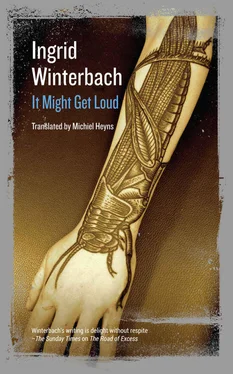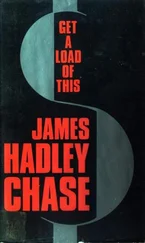‘Iggy,’ says Karl, ‘as soon as you’ve recovered, and you feel like coming with me, I’m coming to fetch you. You can come and stay with me for a while at any time. Do you know, on the way here I didn’t really attend that closely to the things around me. I was too upset. I’m in any case not all that tuned into nature, but I suppose I could have been more attentive. We could perhaps make a good trip of it back. This time I’ll be able to attend more closely. I was too cut up, I was too tensed up about you, Iggy. I didn’t know what the hell to expect. I’m so glad you’re alive. Don’t worry, Iggy. The evil or whatever you want to call it has been conquered. A new era is dawning, I’m sure of that. You’re safe. We can take our time driving back, because I think the Karoo is actually very beautiful, it’s just that I wasn’t in any condition to enjoy it. Though I did stop at the Orange River. The water flowed so quietly and broadly under the bridge. We can buy a book on bats. You were always interested in animals, more than me. Different kinds of animals. Mammals. I’m sure there’s a lot to see, if you take your time and open your eyes. You could say I sped through the landscape with my eyes shut. There must be lots of little animals — jackals and tortoises, probably little buck too, and meerkat and polecat. Pa told us about the different kinds of polecat. I saw only one or two dead jackals and tortoises next to the road, and strange black worms, on their way to hell knows where. To and fro across the road. Jesus, I was in a state, but now everything is actually okay again. Now you must just get better.’
Karl jabbers on in this manner, not knowing whether Iggy can hear him. It doesn’t matter, he has to reassure himself in this way, not only his brother.
Shortly afterwards the nurse comes to fetch him, it’s time.
Later that morning he talks to the doctor. A Doctor Linsom. (Karl at first hears: Doctor Lonesome.) A small man with hairy arms and a high, raspy voice. But at least he’s friendly. What’s the prognosis? Not good. Iggy is suffering from serious delusions. He may have to stay here for quite a while. Perhaps even be given shock therapy, if ordinary medication doesn’t do the trick.
Back in his car Karl thinks of what the Joachim-chap with the beetroot claw said: Iggy is very close to the abyss. His soul, his being, is imperilled, he’s on the brink of a bottomless abyss. He is fighting for the survival of his soul. He may already have had too long an intimate conjunction with the other side. The empire of the demons — something like that. Oh Lord, thinks Karl, what if what the guy said is true. What if just some of it is true?
The only consolation is that Iggy recognised him. That means he hasn’t yet plunged headlong down some bottomless abyss. This is for the time being Karl’s only hope.
*
That evening Karl buys a six-pack of beer and drops in on Jakobus Coetzee again. He once again sits on the garden chair, Jakobus on a log. The single light bulb above them casts a feeble light, because the room is big. Jakobus has lit a few candles and a small reading light on the floor next to his bed helps to provide more light. In the evening this space looks even stranger — the plethora of objects casts menacing shadows because large sections of the hall-like interior are unlit.
Jakobus inspires confidence in Karl. He has a great need to talk to him so that he can get rid of some of his pent-up tension, and gain some clarity on Iggy. He tells Jakobus about his visit to the psychic, and that it didn’t produce much. (He doesn’t tell him that the woman sensed a place with unholy goings-on, darkness, death and anger. And that one of the men she saw dreams of dead people and bites his hand while sleeping.) He tells him about the Joachim-chap with the beetroot claw. Jakobus apparently finds it all very interesting, he listens attentively. My goodness, hey? He says every now and then, and: Well, well, well.
What does he think of it all? Karl asks him.
‘Look,’ says Jakobus, ‘I suppose one must take all these things seriously. The probable as well as the improbable. Take all things into account, I suppose.’
Karl tells him about the Sheddim (which he still hasn’t googled).
Jakobus knows about it. He also, he says, struggled for the survival of his soul, one could say. It was no minor skirmish and the outcome was always in the balance. He and Josias were friends in their youth, but then Jakobus turned his back on him for seventeen years. It was in this period that he struggled with demonic powers that might as well be called the Sheddim, says Jakobus. He also suffered from delusions, but of a more insidious and treacherous kind. Now his troubled soul has Godbethanked returned to his body. Now he has peace. Now he picks up pigshit with a spade and bucket. Now he’s found a place to rest his head, among the destitute of all colours.
Jakobus has a slow, hesitant manner of speaking. A broad, weathered face; a sympathetic, but attentive gaze.
Karl has not yet told him about Iggy’s letters and allegations against Josias.
‘What kind of a guy is Josias actually ?’ he asks.
‘The short version,’ says Jakobus, ‘is that Josias is virtually a genius at large-scale projects. Something between a visionary and an activist. But the Lord help anyone who crosses him.’
‘Why would Iggy want to do that?’ Karl asks. ‘He’s not a guy who thrives on confrontation. He’s the gentlest soul I know.’
Jakobus first slowly rolls a cigarette.
‘That I can’t tell,’ he says. ‘I don’t know what set the ball rolling. Possibly a matter of contradictory and irreconcilable personality types. Two people who were never meant to sit by one fire.’
‘Iggy liked the place at first.’
‘It sometimes takes a while for mutual conflict to manifest itself.’
‘Iggy accused Josias of terrible things,’ Karl says. ‘And the chap with the beetroot claw said in so many words that Josias is … an instrument of darkness.’
Jakobus sniffs. Takes a swig of beer. Looks down. Remains silent for a while.
‘Look,’ he says, ‘you must understand, Josias’s life before he came to settle here was anything but exemplary. He always was and still is an anarchist and a shit-stirrer of note. If somebody had then wanted to describe him as an instrument of darkness … well … with a bit of poetic licence it wouldn’t have been altogether inappropriate.’
For the time being Karl doesn’t question him any further. At the moment he doesn’t have the necessary objectivity or distance to distinguish between Iggy’s delusions and reality. He thinks his own grip on reality has recently been dealt too much of a knock. Heard too many crazy things, too quickly in succession.
But at least at present he’s finding Jakobus’s presence consoling, and he doesn’t feel so fucking alone and doomed to deal with Iggy’s condition on his own.
*
For three days he visits Iggy every morning, and every day his condition is unchanged. Sometimes Karl sits with him in his room for a long time. Iggy is like a man unconscious, or comatose, so heavily sedated is he. He’s lying so still, it’s hard to imagine that perhaps at some level he is still being tormented. Karl cannot imagine what his brother is dealing with in that deep, apparently dreamless sleep. On the surface Iggy seems untroubled, but underneath he may still be fighting for the survival of his soul, as the Joachim-guy said.
Karl asks whether it’s necessary for Iggy to be so heavily sedated and Doctor Lonesome says it’s part of the cure, for the time being he must sleep as much and as deeply as possible before they put him onto other medication.
Karl thinks: The idea of the deep sleep must be to get rid of the delusions. When Iggy has all his wits about him again — is awake, in his right mind — his memory will have been wiped clean like a slate. All delusions deleted. As if he never had all those thoughts. For Iggy’s sake Karl hopes that something like that is possible.
Читать дальше












